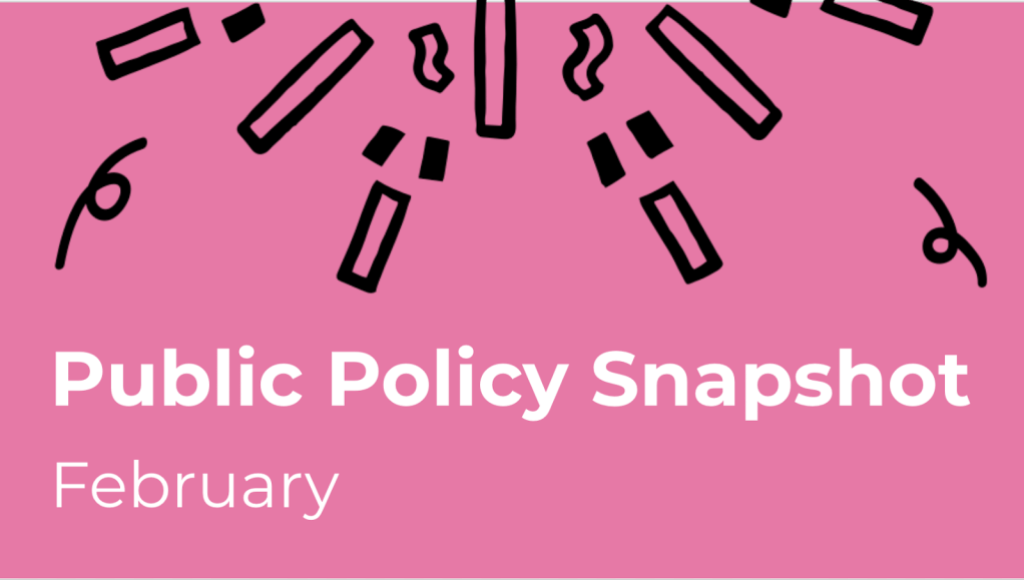
The Wikimedia Foundation’s Global Advocacy team works to protect and promote a global regulatory environment in which everyone can freely share in the sum of all knowledge. The month of February 2022 has been a busy one when it comes to legislative and regulatory developments around the world that shape people’s ability to participate in the free knowledge movement. In case you blinked, we’re happy to catch you up. In this article we review the most important developments that have preoccupied us and the actions we’ve taken to advance fundamental rights online such as the freedom of expression, privacy, and access to knowledge. We’ll also highlight the team’s work to protect the public-interest Internet, and our vision of an online ecosystem in which everyone can freely produce, access, share and remix information. As a global movement, Wikimedians can uphold this vision together.
To learn more about our team and the work we do, follow us on Twitter (@WikimediaPolicy) or sign-up to the Wikimedia public policy mailing list. The team’s Meta page is under construction.
US Legislative Developments
- EARN IT Act: The Global Advocacy team opposed the EARN IT Act, which would significantly weaken protections that online intermediaries, like Wikipedia, have from liability concerning child sexual abuse material (CSAM) and undermine encryption. The Foundation has signed an open letter opposing the bill alongside a coalition of more than 60 other concerned organizations, which was published by the Center for Democracy and Technology. The team also published a blog post outlining the negative impact that the legislation, and others like it, would have on freedom of expression, privacy, and open knowledge projects like Wikipedia. Although the legislation passed out of the US Senate Judiciary Committee, the team’s blog post and open letter were introduced into the official record.
- Copyright and related rights: The Public Policy team advocated for copyright standards that would support the free and open nature of the internet on two counts. First, we signed an open letter against the Journalism Competition & Preservation Act (JCPA), which proposed granting media organizations the right to restrict third parties from linking to external content. These basic fair uses are essential to millions of websites and online services like Wikipedia, as they use links to connect content to online communities large and small. To further advocate for copyright norms that enable the free exchange of knowledge, we also submitted comments to the US Copyright Office ahead of upcoming proceedings evaluating technical standards for protecting copyrighted works online.
Latin America and the Caribbean
- Chile: The Chilean Congress has been considering a very concerning bill to regulate digital platforms since September 2021. If approved, the bill has the potential to become a misguided influence on similar regulations throughout the region. Both international and Chilean groups, including Wikimedia Chile and WMF, have expressed concern over the overly broad nature of the bill, lack of consultation with civil society, and last-minute hearings around the legislation. The Global Advocacy team has been supporting Wikimedia Chile to analyze the bill and its legal implications for open knowledge projects like Wikipedia.
Asia
- SIM Card Registration Act in the Philippines. We endorsed a coalition letter to the President of the Philippines urging him to veto the SIM Card Act. The act targets telecommunications and social media entities in such a way that ultimately criminalizes pseudonymity online. The Act forbids the use of pseudonyms when registering accounts with social media, establishing a minimum of 6 years in prison and/or a harsh fine. It sets a worrying precedent of curtailing freedom of expression and privacy in a way that could apply to other online sites, including Wikimedia projects.
- Myanmar Draft Cybersecurity Law: A draft Cyber Security Law in Myanmar has been introduced one year after a military coup deposed the country’s democratically elected government. The law includes overly broad and poorly defined prohibitions and requirements that are inconsistent with international standards related to freedom of expression. Additionally, the military would have the legal authority to order content deleted, block digital platforms, seize individuals’ devices, and criminalize the use of VPN all without due process. Civil society and human rights organizations have supported a statement by the Global Network Initiative (GNI) calling for the withdrawal of the law.
European Union
- Our colleagues from the Free Knowledge Advocacy Group EU have been promoting the interests of EU Wikimedia Affiliates. The Digital Services Act (DSA) is in trilogue, i.e. the three main EU bodies have adopted their respective positions and are now negotiating over a common version. We support language adopted by the Parliament that differentiates between a) terms of use of a platform operator and b) the rules set by the communities that use the platforms. In addition, we endorse the Parliament’s view on intermediary liability that leaves room for community-lead content moderation.
Additional Developments
- Online Safety Bills: the Global Advocacy team published a blog post on the common pitfalls of online safety regulations. Such bills generally address the symptoms rather than the causes of online harms and, in the process, threaten open knowledge communities and individuals’ fundamental human rights around privacy, freedom of expression, and access to knowledge. Online safety bills have been proposed in Australia, the UK, and Canada, and we are closely following the debates around them.
- Human Rights Policy: The Global Advocacy team participated in an Office Hour with the Board of Trustees on 17 February to brief the Movement on the recently adopted Human Rights Policy and to answer questions from the community. The briefing emphasized the Foundation’s commitment to protecting and upholding the human rights of Wikimedia users and consulting the community.

Can you help us translate this article?
In order for this article to reach as many people as possible we would like your help. Can you translate this article to get the message out?
Start translation